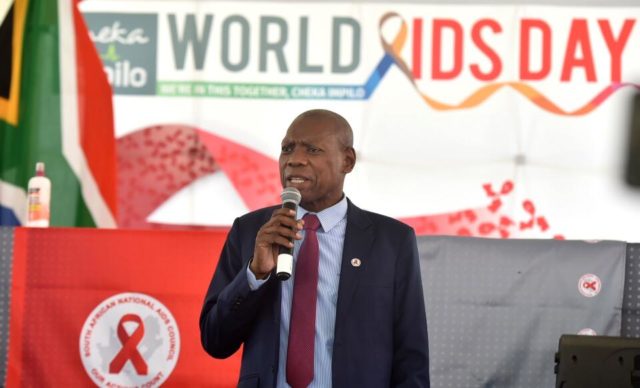Health Minister Zweli Mkhize has implored South Africans to make sacrifices this festive season.
Johannesburg – Health Minister Zweli Mkhize has implored South Africans to make sacrifices this festive season for the betterment of all.
Mkhize, speaking on Saturday during the World Universal Health Day virtual event, said people had a choice to make – life, sickness or death.
He again warned South Africans that the second wave of the Covid-19 would do more harm than the first wave.
South Africa entered the second wave of the coronavirus this week, with daily new infections climbing from 6 000 on Monday to over 8 000 new infections per day for the rest of the week.
Before this week, the last time new infections peaked at over 6 000 infections per day was on August 14.
The Eastern Cape, Western Cape, KwaZulu-Natal and Gauteng accounted for the vast majority of new cases.
“The time has come for South Africans to make a choice – life or sickness and death.
“If we choose life, then we must realise that we have to make sacrifices during this festive season.
“It will not be possible to celebrate the holidays in the way we are accustomed to.
“We must now understand that the frivolities that are usually associated with the festive season must make way for the things that really matter – family and friends, caring for one another, physical and spiritual rejuvenation and preserving the spirit of ubuntu,” he said.
He called on all to commit to saving lives and protecting one another, by adhering to small gatherings, responsible drinking, frequent sanitising or washing of hands and surfaces, social distancing and constant mask wearing.
“This year, as we commemorate World Universal Health Coverage Day under the theme ‘protect everyone,’ we find ourselves in the midst of a second wave that seems determined to dwarf the first wave.
“As we are confronted by the heavy storm approaching us, I must take the opportunity to appeal to the public, particularly our youth, to be fully conscious of their agency and the role they must play to protect everyone from the devastation of Covid-19,” he said, adding that government would do all it could in the fight against the virus that has already claimed the lives of 20 000 people in South Africa.
“But this virus can only be defeated by each and every South African’s sense of duty and compassion.
“Only you have the power to stop Covid-19,” said Mkhize.
Meanwhile, Mkhize said his performance agreement which he had signed with President Cyril Ramaphosa, said the country much achieve 90% universal health coverage through the government’s NHI policy by 2030.
“The preamble to the NHI Bill recognizes the socio-economic injustices, imbalances and inequities of the past; the need to heal the divisions of the past and to establish a society based on democratic values, social justice and fundamental human rights; and the need to improve the quality of life of all citizens and to free the potential of each person.
“It subsequently enjoins us to achieve the progressive realisation of the right of access to quality personal health care services by making progress towards achieving Universal Health Coverage whilst ensuring financial protection from the costs of healthcare.
“The Bill fundamentally sets out to achieve this by pooling public revenue in order to actively and strategically purchase health care services based on the principles of universality and social solidarity,” said Mkhize.
He also said the Covid-19 pandemic had given government and private healthcare service providers to pool-in resources and work together for the first time.
“Whilst government led the response both financially and strategically, ultimately it was through the multi-sectoral working relations that successful expression of social compacting was achieved – the manifestations of which were high awareness of the disease, community mobilization and buy in, active citizenship and a government response based on evidence through high consultation with all key stakeholders.
“We are therefore feeling highly encouraged by the progress that has been made towards universal health coverage in this country, even as we faced significant pushback from the advent of Covid-19.
“Indeed, despite our gallant efforts not to be diverted from our path towards universal health coverage, the pandemic has made its impact felt.
“However, as government, we remain resolute not to shift goalposts and to stick to the plan, for the sake of our people whose constitutional right to quality health care can never be compromised,” said the minister.
IOL








